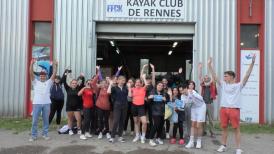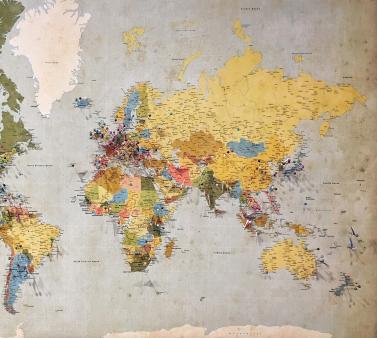
Please tell us how you came up with the idea to create the Termin'eau project?
In some specialized fields, there are few or no reliable online resources, and in order to translate a text, it is then necessary to consult with experts in the field to obtain the necessary terminology and linguistic information. In an article, my colleague Isabelle Collombat notes that the more experienced translators are, the more likely they are to use this method. So, over the last several years, I have been thinking about the best way to teach this concept and methodology to students of the "Translation and Multilingual Communication" program.
In 2019, I was invited by my colleague Jean Quirion from the University of Ottawa to participate in his Termino by Bike course. Thanks in part to the support of the International Relations Office, I was able to take part. Students cycle from Montreal to meet with terminology and translation specialists in various fields (Radio Canada, Deloitte, translation and communications agencies, freelancers, etc.). He also teaches this course at a distance, but he has found that people who take it online produce poorer results. So I wanted to propose a similar project, which combines interviewing experts to translate a specialized text with practicing the activities involved. The course was made possible thanks to a leave of absence for pedagogical projects (CPP) granted by Rennes 2 University.
How did this first edition of Termin'eau unfold?
The course took place during one week at the beginning of the academic year 2022, before the beginning of the tutorials (there are no lectures in this course). On the first day, we formed teams and did an orientation race. With Maryline Berthomé and Asli Ghebantani, pedagogical engineers at the University Pedagogical Service, we placed envelopes with questions about the translation and specialized writing professions, as well as the planned activities and their terminology, in strategic locations on the Villejean campus: at the university information and orientation service, professional insertion (SUIO-IP), the university library, etc. It was a good opportunity to discover these useful places for students who sometimes arrive from other courses directly at the 3rd year level. The next day, we practiced rowing, kayaking, kayak-polo and canoeing. The rest of the week was devoted to interviews with a translator specializing in sailing, and with specialists in these activities: instructors, and a high-level athlete, Mathis Soudi, who participated in the Tokyo Olympic Games in slalom kayaking. At the beginning of the week, I had given the students technical texts in English, Spanish, German and Italian (kayak purchase guides, instructions, sports rules, etc.); interviewing the professionals and practicing the activities served to establish the terminology, i.e., to prepare the dictionary of the texts for translation into French.
Why did you choose to focus on nautical activities in particular?
As I mentioned, the exercise consists of working on terminology that does not yet exist online or that is not necessarily reliable, and this is the case for nautical activities since there are mostly only informal documents available. But it was also a question of adapting Jean Quirion's course to our Breton context. Termin'eau is an opportunity to create or strengthen links with regional companies, in a specialized sector that could one day be a source of recruitment for translation and the management of related documentation. So it's also a great opportunity to broaden the scope of what we are teaching to our students.
The other added value of this type of experience is the sharing of informal time, which makes it possible to get to know each other and to establish a relationship of trust between a teacher and those being taught. I believe in the importance of this relationship to progress in learning.
How did this first experience go overall?
It was very positive on several levels. Termin'eau has created a real group dynamic, a good atmosphere and exchanges; this is what the students remember the most. Students who arrived in at the third year of the program have also discovered and understood the concordancer computer program which is used in several other specialized translation courses. In addition, the interviews gave them confidence in their ability to interact with specialists, to tackle a totally unknown field. Miranda Joubioux, the translator, also gave them a lot of information about her experience and practice.
What remains to be improved is the use of the tool (a terminology table) and the use of the interviews.
What are the next steps for the project?
We are going to do it again next year, with the same formula to ensure that the pedagogical process is well established. At the same time, I'm looking for sponsors or companies that would like to take part in the project and act as experts for the interviews. The objective remains, at the beginning of the school year 2024, to go sailing for five days, as it is a very technical sector with a lot of terminology. The counterparts of the sponsorship are to be decided together. It would be interesting, for example, if at the end of the project, the students could give feedback to these structures to talk about the skills they have acquired.



